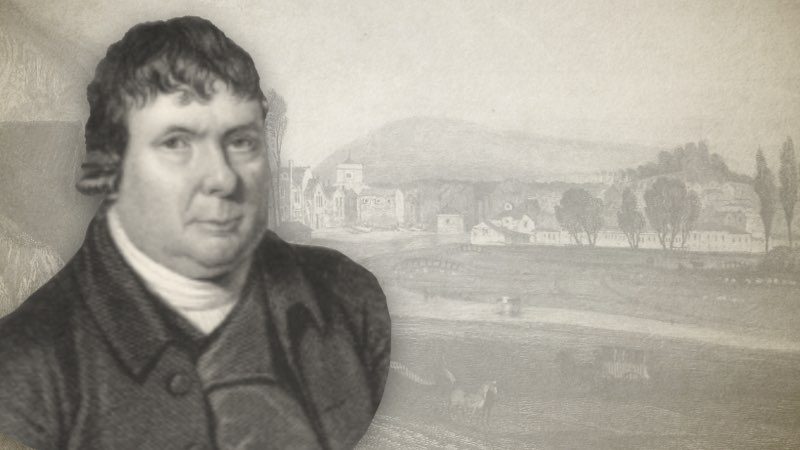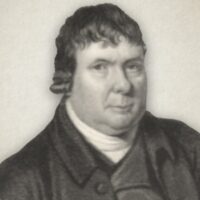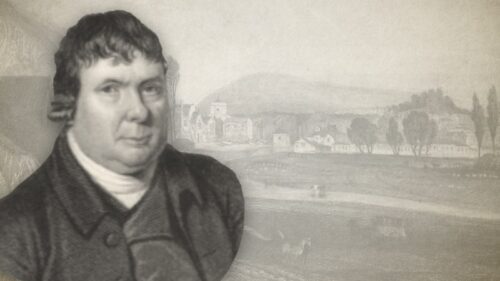
The Child of Liberty in Legal Bondage: Wrath (4/11)
4. To treat of the wrath that works in us, which is this spirit of bondage.
“The law worketh wrath,” Rom. iv. 15. All that the broken law ministers, reveals, or works, in a man, is the anger, displeasure, indignation, and wrath of God at the sins of men; which wrath is revealed in the law against all ungodliness, and is treasured up there. Fury is not in me, saith the Lord. It is not in him as considered and viewed by the eye of faith in Christ. Here God cannot, God will not, be wroth with us; but get back to the law, and there we are sure to feel it, as nothing but wrath and death can be found in that broken covenant, which is a killing letter, for God ministers not the Spirit by it. Furthermore, God’s wrath can never work where there is no sin; but where sin is there it will work, if we go to it. It got a sad hold on Christ; it melted his heart in the midst of his body, while he bore our sins upon the tree. When he got rid of our sin he got rid of his Father’s wrath. And it works sadly in the conscience of a believer, and stirs up his old man, when he loses sight of Christ, and gets back to that old yoke; for the burden of that precept was never easy, nor the yoke of bondage ever light. Hence the sad complaints of many gracious souls when influenced by it. “I am the man that hath seen affliction by the rod of his wrath. Surely against me is he turned; he turneth his hand against me all the day. My flesh and my skin hath he made old; he hath broken my bones. He hath made my chain heavy; when I cry and shout he shutteth out my prayer. He was unto me as a bear lying in wait, and as a lion in secret places. He hath filled me with bitterness; he hath made me drunk with wormwood; he hath broken my teeth with gravel stones, and covered me with ashes; he hath moved my soul far from peace, and I forget prosperity,” Lam. iii. “Because there is wrath, beware lest he take thee away with his stroke, then a great ransom cannot deliver thee,” Job, xxxvi. 18. “For in my wrath I smote thee, but in my favour have I had mercy on thee,” Isai. Ix. 10. “For the iniquity of his covetousness was I wroth, and smote him; I hid me, and was wroth. I have seen his ways, and will heal him, and restore comforts unto him,” Isa. lvii. 1.7, 18. “In a little wrath I hid my face from thee for a moment; but with great mercies will I gather thee, &C. &C. Thou was angry with me; but thine anger is turned away, and thou comfortest me.” Hence it appears plain that the law stirreth up the corruptions of the human heart, the enmity of the carnal mind, the old man of sin; and works the wrath and anger of God in the conscience; so that there is wrath, fear, and torment. And the workings of this anger and wrath of the law stir up the anger and wrath of man against both God and man.
Sarah, under this bondage, deals hardly with her maid, drives her from the tent, and makes her fly from her presence; quarrels with Abraham. “My wrong be upon thee, and the Lord judge between me and thee.” No peace can be had while this Hagar, this mount Sinai in the figure, is working in the heart. Job finds fault with all his friends; calling them “miserable comforters, forgers of lies, and physicians of no value;” and there was not a wise man among them. Asaph, while this chastening rod was upon him, was “envious at the prosperity of the wicked, because they are not in trouble as other men, and because they had no bands in their death.” Jeremiah finds fault with “the man who brought tidings to his father, saying, A man child is born unto thee, making him very glad. And let that man be as the cities which the Lord overthrew, and repented not: and let him hear the cry in the morning, and the shouting at noontide; because he slew me not from the womb; or that my mother might have been my grave, and her womb to be always big with me,” Jer. 15-17.
The best and most even tempered person upon earth, under the workings of this bondage, will hiss like a viper. It is a leaven that will ferment, and stir up every corruption of the heart, set all in confusion, and fill the soul with nothing but wrath and indignation. And if such an one has got nobody to find fault and quarrel with, he will quarrel with anything that comes in his head. Job spends a whole chapter against his birth-day. “And job cursed his day. Let the day perish wherein I was born, and the night in which it was said, There is a man child conceived. Let that day be darkness; let not God regard it from above; neither let the light shine upon it; let darkness and the shadow of death stain it; let a cloud dwell upon it; let the blackness of the day terrify it; let it not be joined to the days of the year; let it not come into the number of the months; let them curse it that curse the day,” Job, iii.
Nor does the enmity of the heart, when stirred up by a spirit of bondage, stay itself upon men and things only; but even God himself comes in for a share. “The carnal mind is enmity against God.” And this enmity is a member of the old man which he will hold fast as long as he lives. Job multiplied words against God, and lied against his right. “I sat alone [saith Jeremiah], because of thy hand, for thou hast filled me with indignation. Why is my pain perpetual, and my wound incurable, which refuseth to be healed? Wilt thou be altogether unto me as a liar, and as waters that fail?” Jer. xv. 17, 18. “Thou hast cast off, and abhorred; thou hast been wroth with thine anointed; thou hast made void the covenant of thy servant; thou hast profaned his crown; thou hast broken down his hedges, and brought his strong holds to ruin; thou hast set up the right hand of his adversaries, and hast made all his enemies to rejoice,” Ps. viii. 9. “Thus the foolishness of a man perverteth his way, and his heart fretteth against the Lord.” These are some of the heavy charges that are brought against the Father of all mercies; and confirms, with a witness, the truth of his own proclamation, when he proclaimed his own name, “The Lord, the Lord God, gracious and merciful, slow to anger, and abundant in goodness and truth.” And if he were not so I know not what would become of us.
Thus the law worketh wrath. It communicates the wrath that is revealed in it to us; it worketh the wrath of God in the soul, stirs up the wretched enmity of the heart, and fills it with anger against every thing. Such a soul fretteth against God. It envies the happiness of the righteous, and the prosperity of the wicked. This bondage fills the soul with hatred, and makes men hateful, and hating one another. The heart is filled with madness, and full of cursing and bitterness at every cross, and every thing that lies in the way, though he doth not spit it out. Such an one views God as an enemy, and one that mars his counsels, breaks his purposes, thwarts his designs, and fights against him, when (as he thinks) he aims well and means well. It fills the soul with self-pity; and such an one sits down, and considers himself as an injured man. He will cavil at the master of the household about every penny that is given to another; and is not satisfied with the penny given to him, thinking that himself deserved more. He will limit the Holy One of Israel, and cannot allow the Lord to do as he will with his own. He will envy the happiness and state of every body; think his own lot to be the worst that ever fell to the share of man; and therefore be discontented with every thing and grateful for nothing.
And, for my part, I know of no trial so sharp, no cross so heavy, no sensations so dreadful, no exercise so severe, no dispensation so terrible, no rod that enters so deep, as to be left to struggle with legal bondage. The smiles of a gracious Father are changed into the frowns of an angry Judge; liberty, with respect to the enjoyment of it, is exchanged for bondage; happiness for misery; peace for war; familiarity for shyness; indulgence for cold indifference; tenderness for sensible neglect; attracting love into forbidding terror; a mercy-seat for a throne of judgment; and the best of friends, into the appearance of an enemy. “Terrors are turned upon me [says Job]; they pursue my soul as the wind, and my welfare passeth away as a cloud. My bones are pierced in me in the night season, and my sinews take no rest. He hath cast me into the mire, and I am become like dust and ashes. I cry unto thee, and thou dost not hear me; I stand up, and thou regardest me not. Thou art become cruel to me. With thy strong hand thou opposest thyself against me; my harp also is turned into mourning, and my organ into the voice of them that weep.” I come now,
William Huntington (1745-1813) was an English Calvinist preacher and prolific writer. His influence spread across the country and denominational lines. John Hazelton wrote of him—
“He published one hundred books, large and small, and once mentions being "weary at night, after having been hard at writing for fifteen hours during the day." Henry Cole wrote of him—‘’It may be asked why in my ministration, such as it is, I make frequent allusion to the ministry of that great and blessed servant of the Most High, the late Mr. Huntington. The reasons are these—1st. Because I believe he bore and left in Britain the greatest and most glorious testimony to the power of God's salvation that ever was borne or left therein. 2nd. Because I believe he planted the noblest vine of a Congregational Church that ever was planted therein; and 3rd. Because I believe the Churches that maintain the vital truths he set forth form a very essential feature in the Church-state of Christ in the land in these times, and perhaps will do so to the time of the coming day of God's retribution."
William Huntington, The Child Of Liberty In Legal Bondage (Complete)




